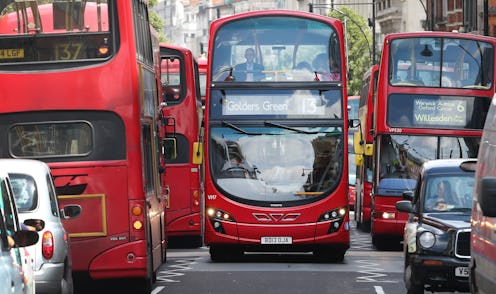News
San Francisco Tech Bus Drivers Vote To Unionize
While the tech industry of Silicon Valley has long been lauded for the perks afforded to its employees — think snacks, on-site gyms and medical facilities, and of course, personal transportation to and from work — the service industry behind these benefits is beginning to stand up for itself. Following a decision last fall by those shuttling the Facebook workforce, bus drivers of Apple, Yahoo, eBay and others have voted to unionize in an attempt to find redress to claims that these bus drivers are "underpaid, overworked and unfairly compensated for time spent on the job."
In a vote of 104 to 38, drivers voted overwhelmingly to join Teamsters Local 853, representing a growing trend for the oft-forgotten support staff of the booming tech bubble to fight for equality in an ecosystem that is becoming increasingly gentrified, thanks to the sudden influx of young wealth. With companies like Apple, Yahoo, eBay, Zynga, and Genentech providing shuttle systems for their employees from their suburban (or urban) neighborhoods to their places of work, these buses have become an almost offensive reminder of the stark contrast between the have and the have-nots in northern California. Google, Facebook, and other tech employees who can afford to pay thousands of dollars in rent each month have driven real estate prices through the roof, displacing families and businesses and creating one of the greatest contrasts in income inequality in the country.
And bus drivers have suffered much of the brunt of this inequity.
The drivers, who work for Compass Transportation — the contractor is used by tech giants like eBay, Apple, Yahoo, Genentech and Zynga, as well as Amtrak — have claimed to work 14-hour days for unfair rates of compensation that simply don't pay enough for them to live in the same neighborhoods (or even general areas) that their passengers do. In a statement, driver Tracy Kelley said, "We need wages commensurate with what it costs to live in this area, but it’s not just about wages. It’s about having better working conditions." Most days, Kelley noted, she leaves her home to begin the workday at 6 a.m., and is unable to return home until after 8 p.m., clocking hours that are unheard of for the tech industry — at least, those who live the more glamorous part of it. But while employees of the Facebooks, Googles and Yahoos of Silicon Valley seem to live, and more importantly, work in the lap of luxury, there are a number of other company workers who inhabit the same workspace, but receive none of the perks and benefits.
Take, for example, the rarely thought of janitors, food service workers, and security workers, few of whom are actually directly employed by tech companies. Rather, in the "race to the bottom" mentality that has permeated what seems to be the entire business sector, these support staff are contracted through third-party employers, meaning they can, quite literally, look but not touch when it comes to many of the most attractive features of Silicon Valley's finest. And while many of these workers are part of unions, bus drivers have long been kept out of the loop, suffering obscenely long shifts whilst only being paid for a normal, eight-hour workday.
But with this latest vote, 65 percent of tech bus drivers are now part of the same union. Until this very recent decision, a mere 15 percent of these drivers were represented by Teamsters. And luckily, it seems as though the majority of the tech companies using these bus drivers are open to negotiations that would raise their salaries. If history is any indication, earlier in February, Facebook signed a new contract with their bus drivers (also represented by Teamsters), raising their salaries from $18 an hour to $24.50 an hour.
In many ways, this unionization is a win-win for both workers and the Silicon Valley tech companies, Rome Aloise, the president of the local Teamsters union noted to Forbes. "[Companies] should welcome this,” he said of the vote and the ensuing contracts. “It helps them with problems with division of wealth. These allow the drivers who drive around a very valuable commodity — their workers — to have a decent life."
Of course, the shuttle service and other aspects of Silicon Valley life have had adverse effects on a number of other entirely non-affiliated members of the tech community, which still remain to be addressed. With little room to expand, the 800,000-strong population of San Francisco, many of whom have been in the city for generations, have nowhere to go, but are being forced to relocate after being outbid by newcomers to the city and tech industry. In fact, employees of companies like Google and Facebook make twice the salary of the average San Franciscan, and in 2013, Federal Reserve Bank of Cleveland research economist Daniel Hartley told Newsweek that "there were more eviction notices served on units than there were new ones built."
While San Francisco may look, to the uncritical eye, to be a bastion of new wealth, innovation and creativity, what many statistics about the median and average salaries of the California city overlook is the fact that San Francisco is now home to the second largest income inequality gap in the United States. And when people are evicted from their long-time houses or apartments, they can't just find another place to go — for the most part, they have to leave the city.
So even as we celebrate this small victory for tech bus drivers, the larger issue of gentrification in San Francisco has yet to be resolved, and for many, we are running out of time.
Images: Getty Images (4)
